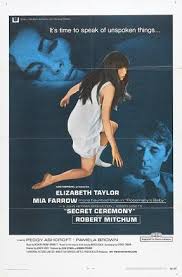
SECRET CEREMONY
Britain, 1969, 109 minutes, Colour.
Elizabeth Taylor, Robert Mitchum, Mia Farrow, Pamela Brown, Peggy Ashcroft.
Directed by Joseph Losey.
Secret Ceremony was directed by Joseph Losey, one of the films that has quite a reputation in his repertoire. A Hollywood director, he was blacklisted (and portrayed under another name by Martin Scorsese in the blacklist film Guilty by Suspicion, 1991). In England he directed under pseudonyms, but by the '60s had gained a great reputation with such films as The Servant and King and Country. Prior to this film he made Boom, from the Tennessee Williams play, The Milk Train Doesn't Stop Here Anymore, with Richard Burton, Elizabeth Taylor and Noel Coward.
Here he works again with Elizabeth Taylor as well as Mia Farrow. Both actresses are very effective in their unusual roles, the prostitute and the schizophrenic young girl who interact and play games as mother and daughter. A bearded Robert Mitchum is the unusual man in the film. The supporting cast mainly consists of two eccentric aunts played by Pamela Brown and Peggy Ashcroft. A striking cast, claustrophobic sets of a house which looks like a blend of a cathedral and a mausoleum, intense study of relationships, sanity and insanity, despair.
1. The impact and interest of the film? A chamber piece, claustrophobic?
2. The strength of the star cast, the work of Joseph Losey?
3. The house (cathedral and mausoleum), a sense of period, the late '60s? The musical score by Richard Rodney Bennett?
4. The title, the rituals in the house, births and deaths, baptisms and funeral rites? The interactions of the two women?
5. The atmosphere of mystery, psycho-drama, play-acting? Reality and unreality?
6. Elizabeth Taylor as Leonora, the glamorous prostitute, her style, on the bus, present at the baptism, the cemetery and the memory of her dead child, her responsibility? The encounter with Cenci, her following her on the bus, beside her, luring her home? The meal? The growing dependence on Cenci?
7. Mia Farrow as Cenci, screen presence and style, at the cemetery and the church, following Leonora, the encounter on the bus, speaking and silent? Luring Leonora home? Making the breakfast, the attentive daughter?
8. The interactions in the home, controlled by the style of the house, the rooms and its furnishings, light and darkness, galleries and paintings, artwork? Bedrooms, wardrobes? Meals? The unravelling of the story of Cenci and her mother? Leonora becoming her mother, Cenci becoming the daughter? The quality of the relationship, love and/or dependence? Her staying? The visit of the aunts, their comments, the pilfering of jewellery and nick-nacks?
9. Cenci and the play-acting and games, changing voices, identity, talking about Leonora? To her? Her age, the possible schizophrenia? Normality and abnormality? With Leonora, with the aunts, talking about their stealing? The stories of Albert, sexual relationship, stepfather, her real father (and his photo)?
10. The aunts, Leonora's visit to their shop, their pilfering, intrusion, oddity? Their gossip and comments about Cenci's parents, their deaths? Leonora and her visit, the control? Their reaction? Eccentric character portraits?
11. Albert, Robert Mitchum's presence and style? His hovering outside the house, Cenci's reaction, Leonora's? The backgrounds of stories about him, the truth? Relationship with his wife, separation, death? The sexual advances to Cenci - who was seductive? Leonora and her reaction against Albert?
12. The growing psychological tension, the reunited family, play-acting, the house, who controlled whom, the rites and ceremonies?
13. The ultimate clash, Leonora and the truth, Cenci referring to Leonora as herself? The breaking in of reality? Cenci being overwhelmed, the ritual of killing herself?
14. Her funeral, Leonora and her grief, her own daughter's grave, the sudden brutal killing of Albert?
15. Themes of relationships, madness, sanity, play-acting, games and reality?